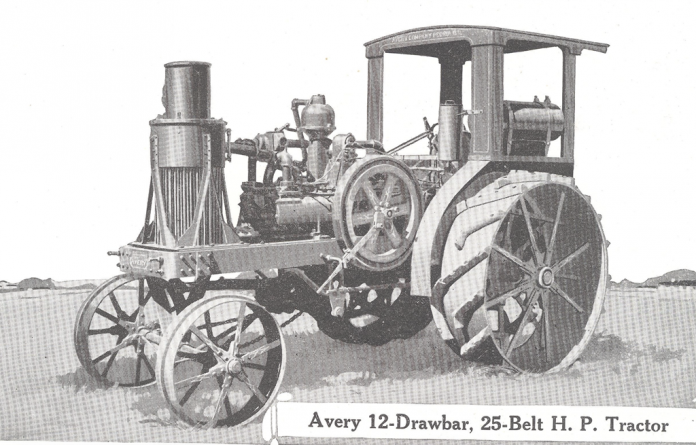One hundred years ago, during World War I, the U. S. Army was busy drafting men to train for new units and to replace the mounting casualties among the troops that were already fighting in Europe.
As a result, farm help was scarce and expensive so gasoline tractors were becoming more and more popular on American farms. This was great, but many new tractor owners “had no idea why they went when they went or stopped when they stopped.”
These tractor owners were therefore dependent upon tractor “experts,” some of whom were shady characters.
For example
An article in the October, 1918 issue of Tractor World magazine, by L.R. Van Volkenburg, who was then a service engineer at the Avery Company in Peoria, Illinois, after pointing out to its dealer readers that “the greatest service you can render customers is to teach them how to handle and properly care for their machines,” uses the following story of one of these men to illustrate his point.
(Farmer) Jones bought a new tractor (presumably an Avery although the make is never identified) which he was capable of operating himself. After being used for some time, the tractor refused to start and Jones, who had had some prior experience with gas engines, worked on it for a day or two with no success.
Finally, he called for help from some of his neighbors who professed to be gas engine men. Well, they couldn’t figure it out either, and the lifeless tractor sat there. At last, the frustrated Jones called in a ‘tractor expert,” who of course charged a hefty fee for his services.
This guy came and quickly located the trouble, a simple matter of a governor spring having come unhooked. However, to maintain his status as a “tractor expert,” he spent a lot of time tinkering with this and that.
Then the owner, who had been keenly watching the expert in hope of learning something, was called away for a moment. Mr. Expert quickly reconnected the spring and when Jones came around again the repairman told him that the problem was solved and the tractor would be fine, which of course it now was.
The engine started right up and ran perfectly, Jones was satisfied and gladly paid the bill, and the serviceman left with a flowery reputation in that neck of the woods for having some superhuman knowledge which it was not possible for a mere dirt farmer to attain.
Problem continued
This should have been the end of it, and it was, for a while. Then that pesky spring came loose once more and again the tractor wouldn’t start. Jones didn’t waste his or his neighbor’s time trying to fix the trouble this time; he just called for the “expert,” believing that individual was the only person in the world who could fix the thing, and out of desperation willing to pay his time and expenses, which weren’t cheap.
As the summer wore on the same scenario was repeated two or three times and Jones was always kept in the dark as to what was really wrong with his machine. Mr. Jones, at last, wearied of this ritual and wrote to the Avery Co. to complain.
The letter was referred to Mr. Van Volkenburg, who made a personal visit to examine the offending tractor and to try to pacify a somewhat angry Jones. Well, it took the company man only about a minute to see and repair the problem, but he spent another minute or two showing Jones what he’d found and how to easily correct it should it again happen.
Van Volkenburg wrote, “This same tractor ran a number of years, to the writer’s personal knowledge, without an expert again visiting it.” The article concludes with, “The farmer doesn’t want to know about the principles of combustion or the technicalities involved in valve timing, air velocity, air friction, or carburetion, neither does he need to know about magnetism, eddy currents, watts, volts and amps.
“He simply wants to be told in a few simple words how to adjust his carburetor, test his magneto, and what care his machine requires to stay in top running condition.”
Similar situation
Apparently, farmers haven’t changed much in the past century, based on the controversy taking place today about the farmer’s right to work on and repair his own machinery. The difference is that Jones had an owner’s manual of perhaps thirty or so pages, along with a monkey wrench, a screwdriver and a pair of pliers.
The farmer today needs expensive test instruments, a computer, and a well-equipped shop, along with specialized knowledge of computer software and dozens of other things.














Where can I get a replacement cloth bag for a cyclone seeder? Calling the company doesen’t work.